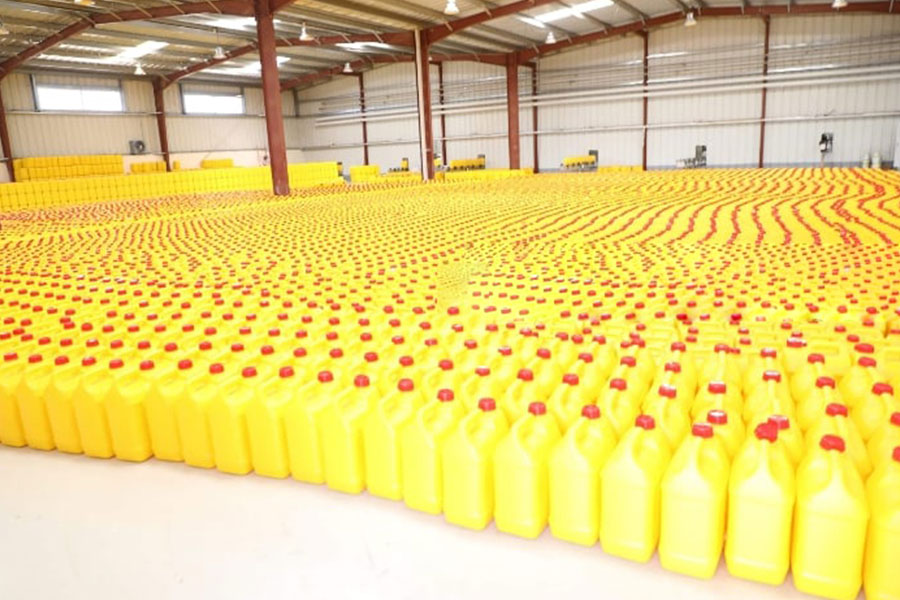
Fortune News | Apr 17,2021
Apr 13 , 2025
By Mark Blyth
With the Trump Administration imposing "insane" tariffs on the rest of the world, many commentators are worried about the problem of “sane-washing”: imputing cogent rationales to policies that have none. Such naive punditry, they argue, distracts from the grift that is unfolding before our eyes. The Trump family’s moves into the crypto sphere, where its meme coins serve as an open invitation for bribes, certainly supports this interpretation.
But, is this the only conclusion to draw, or could something else be going on?
Consider an alternative explanation.
The US project of promoting global free trade had already been abandoned by the time of the 2016 election, when both Donald Trump and Hillary Clinton campaigned against the Trans-Pacific Partnership (TPP). Trump then imposed tariffs on goods from China and other countries, and many of these were maintained or extended under President Jeo Biden. One of Biden’s signature policies, the Inflation Reduction Act, was an attempt to promote US reindustrialisation in green sectors, which, in addition to being protected by Trump’s tariffs, would be subsidised.
Trump’s latest wave of tariffs is also supposed to drive reindustrialisation, albeit of a more carbon-intensive variety. Thus, free trade seems to be off the menu for both Republicans and Democrats.
The reason for this bipartisan embrace of protectionist policies concerns the global role of the dollar in promoting structural trade imbalances. As John Maynard Keynes recognised back in 1944, all countries, left to their own devices, would rather be net exporters than net importers. Today’s net exporters in the European Union, Asia, and the Gulf earn dollars that their own economies cannot absorb, because that would raise domestic wages and prices, undercutting their competitiveness.
The earned dollars are liabilities for local banks, and the easiest way to turn them into assets is to buy US government debt, effectively handing the cash back to the United States so that it can continue to buy exports.
Thus, for the past 40 years, the US has imported pretty much anything it wants by issuing digital IOUs that pay two percent interest without ever being redeemed, because T-bills are the same exporters’ go-to savings vehicle. This means, among other things, that the US has no current-account constraint.
Why would the US want to end this seemingly magical state of affairs?
Because, as Matthew Klein and Michael Pettis argue, defying current-account constraints does, in fact, carry long-term costs. Countries that are net exporters build up huge surpluses at the price of undercutting domestic investment and local wages, which depresses their economies, while the US “benefits” from unlimited cheap foreign goods, but at the price of hollowing out its own industrial capacity.
In 1975, the three largest employers in the US were the Exxon Corporation, General Motors, and Ford; in 2025, the biggest employers are Walmart, Amazon, and Home Depot. The first group made tradable goods, while the latter companies by and large sell imports domestically.
Given these long-term effects, leading figures in both US parties have come to regard the dollar’s “exorbitant privilege” as an exorbitant burden. Both parties want to “rebalance” the US economy by promoting domestic production, which entails a forced adjustment on foreign exporters to curtail their demand for dollars.
Why do they not simply come out and say this?
Probably because talk of “being ripped off” by other countries is more compelling to the base than arguments about the finer points of trade policy. The fact that the Trump Administration lacks a comprehensive plan to rebalance the global order does not mean that such a reordering is not already happening.
After all, Germany’s export engine was sputtering even before the pandemic. Its recent loosening of the “debt brake” (a constitutional cap on structural deficits) and embrace of investment suggests that a rebalancing toward domestic consumption is already underway. The Trump-driven surge in EU defense spending will add more momentum to this trend, and the prospect of a more consumption-driven Euro area will give global investors a viable alternative to the dollar.
As for China, it seems to have realised that flooding the rest of the world with green exports (electric vehicles, solar panels, and so forth) has its limits. It has already diversified away from the US market, and this has increased the need for greater domestic consumption. The rest of export-driven Asia seems keen to set up shop in the US to retain market access.
Such a rebalanced world would need fewer dollars. Ending the current system will be massively disruptive, no doubt, and the prospect of US reindustrialisation may prove illusory. But it is important to remember that both parties see it as necessary. The rebalancing began before Trump arrived on the scene, and is being driven by forces that may outlast him.
PUBLISHED ON
Apr 13, 2025 [ VOL
26 , NO
1302]


Fortune News | Apr 17,2021

My Opinion | Apr 09,2023

Featured | Sep 10,2021

Commentaries | Nov 27,2018

Agenda | May 13,2023

Fortune News | Jan 28,2023

Fortune News | May 23,2020

Radar | Apr 03,2023

Fortune News | Nov 23,2019

Fortune News | Jul 01,2023

Photo Gallery | 178468 Views | May 06,2019

Photo Gallery | 168667 Views | Apr 26,2019

Photo Gallery | 159472 Views | Oct 06,2021

My Opinion | 137078 Views | Aug 14,2021
Commentaries | Oct 25,2025

Dec 22 , 2024 . By TIZITA SHEWAFERAW
Charged with transforming colossal state-owned enterprises into modern and competitiv...

Aug 18 , 2024 . By AKSAH ITALO
Although predictable Yonas Zerihun's job in the ride-hailing service is not immune to...

Jul 28 , 2024 . By TIZITA SHEWAFERAW
Unhabitual, perhaps too many, Samuel Gebreyohannes, 38, used to occasionally enjoy a couple of beers at breakfast. However, he recently swit...

Jul 13 , 2024 . By AKSAH ITALO
Investors who rely on tractors, trucks, and field vehicles for commuting, transporting commodities, and f...

Oct 25 , 2025
The regulatory machinery is on overdrive. In only two years, no fewer than 35 new pro...

Oct 18 , 2025
The political establishment, notably the ruling party and its top brass, has become p...

Oct 11 , 2025
Ladislas Farago, a roving Associated Press (AP) correspondent, arrived in Ethiopia in...

Oct 4 , 2025
Eyob Tekalegn (PhD) had been in the Governor's chair for only weeks when, on Septembe...

Oct 25 , 2025 . By YITBAREK GETACHEW
Officials of the Addis Abeba's Education Bureau have embarked on an ambitious experim...

Oct 26 , 2025 . By YITBAREK GETACHEW
The federal government is making a landmark shift in its investment incentive regime...

Oct 29 , 2025 . By NAHOM AYELE
The National Bank of Ethiopia (NBE) is preparing to issue a directive that will funda...

Oct 26 , 2025 . By SURAFEL MULUGETA
A community of booksellers shadowing the Ethiopian National Theatre has been jolted b...